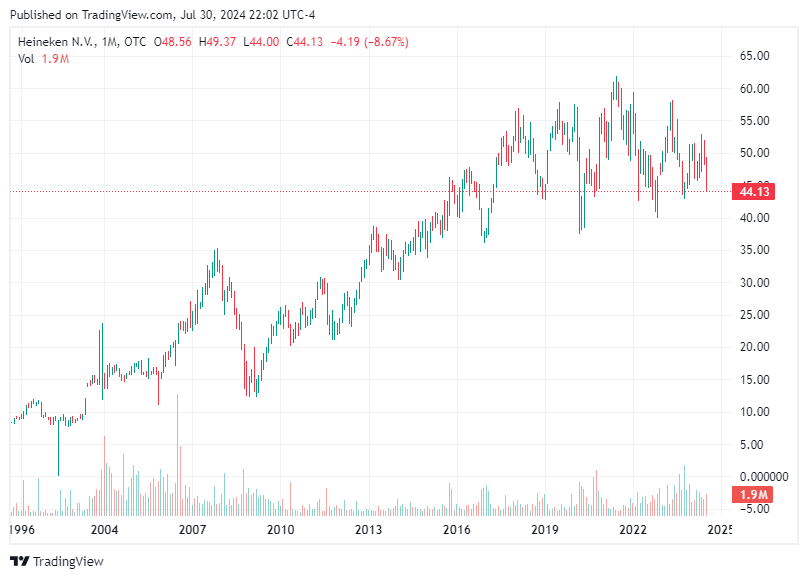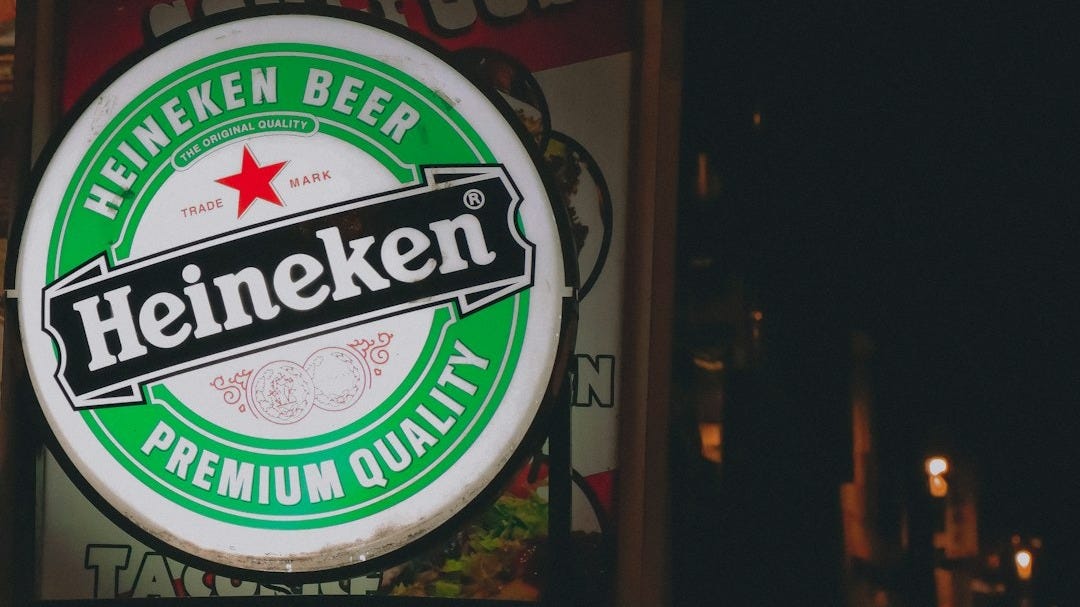Heineken Shares Decline After China Impairment
Heineken Shares Sink After China Impairment Hits Earnings.

Disclaimer: This article is intended for informational purposes only and should not be interpreted as investment advice. The financial markets can be volatile, and past performance is not indicative of future results. Please consult a financial advisor before making any investment decisions.
Real-time information is available daily at https://stockregion.net
Heineken, the Dutch brewing company, has recently faced a setback that has implications for both its financial health and investor confidence. The company's shares experienced a notable drop after it revealed a large impairment in China which adversely affected its net earnings. This situation has raised concerns among investors and market analysts, who are now re-evaluating Heineken's growth prospects in the challenging economic climate.
Background on Heineken's Investment in China
Heineken had previously made a strategic investment in China Resources Beer (CRB) as part of its expansion efforts in the Chinese market. This partnership was aimed at leveraging CRB's extensive distribution network and strong market presence to enhance Heineken's footprint in one of the world's largest beer markets. The investment was seen as a long-term growth opportunity, given China's burgeoning middle class and increasing demand for premium beer products. The economic landscape in China has shifted in recent months, creating headwinds for many Western companies. Concerns over the economic environment, fluctuating consumer demand, and geopolitical tensions have contributed to a more cautious outlook for businesses operating in China.
On Monday, Heineken announced that it would record an impairment charge of €874 million ($948.9 million) on its stake in China Resources Beer. An impairment charge is a non-cash accounting expense that reflects a decline in the fair value of an asset. In this case, the reduced value of the stake in CRB indicates that the expected future cash flows from this investment have diminished.
This impairment charge led to a stark contrast in Heineken's financial performance compared to the previous year. For the first half of the year, Heineken reported a net loss of €95 million, a sharp decline from a net profit of €1.16 billion during the same period last year. The impairment not only affected the company's bottom line but also signaled broader challenges in the Chinese market, impacting investor sentiment and contributing to the 10% drop in Heineken's share price. The write-down of Heineken's investment in China is part of a larger trend where Western companies are grappling with uncertainties in the Chinese economy. Recently, luxury goods brands and automakers have also reported difficulties, citing slowing consumer demand and unfavorable economic conditions. These developments suggest that the Chinese market, once a growth driver for many multinational corporations, is becoming increasingly complex to navigate.
For the beverage industry specifically, the impairment shares the importance of understanding regional market dynamics and consumer behavior. While Heineken's premium segment in China continues to show growth, the overall economic environment poses challenges that require strategic adjustments and careful risk management.
Heineken's Operational Performance
Despite the impairment, Heineken's core business operations have shown resilience. In the first half of the year, the company's consolidated beer volumes increased by 2.1% on an organic basis. This metric includes more than 300 beer brands under Heineken's portfolio, such as Amstel, Red Stripe, Sol, and Desperados. However, this growth fell short of market expectations, which anticipated a 3.2% increase. Key factors contributed to the weaker-than-expected volume growth. Firstly, the timing of Easter, which varied from the previous year, impacted sales patterns. Secondly, intensified competition in Brazil's lower-priced beer segment created additional pressure. Lastly, poor weather conditions in Europe during June further dampened beer consumption.
Nevertheless, Heineken's flagship brand in China saw a double-digit percentage rise in volumes within the premium segment. This suggests that while macroeconomic challenges persist, there are pockets of growth driven by consumer preference for premium products. In light of the recent developments and the impairment charge, Heineken has updated its guidance for the remainder of the year. The company now expects adjusted operating profit to grow organically between 4% and 8%, down from its previous guidance of low- to high-single-digit percentage growth. This revised outlook falls short of the market's expectations, which projected an 8.2% growth.
Heineken attributed the downward revision to several factors. Consumer confidence and economic sentiment in developed markets remain below historical averages, affecting discretionary spending on non-essential goods like premium beer. Additionally, while lower commodity and energy costs provide some relief, concerns about currency fluctuations and inflation in regions such as Africa and the Middle East are expected to offset these benefits.
Considerations Moving Forward
As Heineken navigates through these challenges, several strategic considerations come to the forefront. Firstly, maintaining a focus on premiumization can help mitigate the negative impact of economic uncertainty. By continuing to invest in marketing and innovation for its premium brands, Heineken can capture the growing consumer preference for higher-quality products, even in a subdued economic environment.
Secondly, geographic diversification remains crucial. Expanding into emerging markets with favorable demographics and economic conditions can provide new growth avenues. While China presents current challenges, other markets in Asia, Africa, and Latin America offer potential opportunities for long-term growth.
Lastly, operational efficiency and cost management will be key priorities. By optimizing its supply chain, reducing overhead costs, and leveraging economies of scale, Heineken can improve its profitability and resilience against external shocks. Heineken's recent impairment charge in China has highlighted the complexities and risks associated with international investments. The subsequent decline in share price reflects investor concerns about the company's near-term growth prospects and the broader economic environment. However, Heineken's strong brand portfolio and strategic focus on premiumization position it well to navigate these challenges.
As the global economic landscape continues to evolve, Heineken's ability to adapt and innovate will be essential for sustaining growth and delivering value to shareholders. The company's revised guidance reveals the importance of setting realistic expectations and remaining agile in response to changing market conditions.
Disclaimer: The information provided in this article is for illustrative purposes only and does not constitute financial advice. Readers are encouraged to conduct their own research and seek professional guidance before making any investment decisions.
Real-time information is available daily at https://stockregion.net


